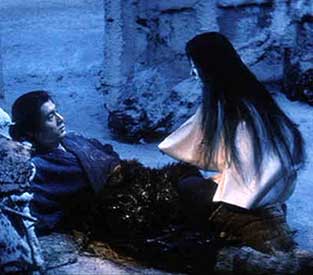Many
people would put a movie by Akira Kurosawa on the list of top ten
films, and that choice would be justified. There are quite a few
Japanese filmmakers who have earned a place on that sort of list.
But for me, the first movie that always comes to mind when I think of
great Japanese films is the horror classic, Kwaidan, directed
by Masaki Kobayashi.
Based
on the ghost stories collected by Lafcadio Hearn, Kwaidan
is spooky, gorgeous, and fascinating. It takes its inspiration from
classic Japanese illustrations of ghost stories. The last time I
watched it I realized something amazing – this lavish production
was filmed entirely inside a studio. This includes a segment
depicting sea battles.
The
first segment, “Black Hair,” is not my favorite, but I like it
more every time I see it. I think it depicts the true experience of
a haunting, which is always more psychological in nature. A samurai
is sick of poverty, so he abandons his wife and marries the vain
daughter of a wealthy nobleman. His fortunes immediately improve,
but he can't forget the wife he so callously abandoned. Eventually
this obsession with the past wrecks his new life, and he goes home
again to salvage his old life. But what is waiting there for him? I
love the gorgeous, moody sets in this one. I especially like the
character of the spoiled new wife. She isn't likable, but she's very
interesting.
The
second story, “The Snow Maiden,” has a lot in common with
European fairy tales. A man witnesses a fey creature killing another
man. She almost kills him too, but she falls in love with him and
can't bring herself to kill him. Instead, she makes him promise
never to tell anyone what he's seen. The actress who plays this
creature manages to make her really scary, just with her body
movements and facial expressions. I think she takes her cues from
classical Japanese theater – at times her expressions are
mask-like. The same actress manages to look warm and kind when the
fey creature imitates a human woman so she can marry the man. The
outcome of this union also mirrors European folk tales – I won't
reveal it here. I love how this segment uses stage techniques for
its special effects.
My
favorite segment is the third, “Hoichi The Earless,” and I
suspect that's the case for most viewers. It has spectacular battle
scenes, and the way they're narrated is particularly brilliant.
Hoichi, a blind monk, is a very talented balladeer, and he knows the
story of the Dan-no-ura battle from beginning to end. As he performs
this ballad, the scenes are enacted. The camera alternates from
live-action segments (entirely filmed inside the studio, though
they're sea battles) to painted panels depicting the battle. You
could consider this the most kick-butt segment of the movie. But I
like it for more oddball reasons. To me, the ghosts in this segment
aren't just shadows of that battle and that ruined clan, they depict
a lost age. The remarkable formality of their lives, the protocol
dictating their day-to-day existence, is marvelous and awe-inspiring
– and lends credence to Shakespeare's assertion that all the world
is a stage.
An
interesting detail from the battle is a scene in which a woman leaps
into the sea with the young emperor rather than risk capture by their
enemies. This woman is steely in her resolve, a stark contrast to
the weeping young woman who quickly follows them into death. It took
me a few viewings to realize that the stern woman who orders her
followers into the sea must be the dowager empress – the boy's
grandmother, rather than his mother (the mother must be the weeping
woman). As the mother of the deceased emperor, she would have had
absolute authority until the boy came of age. Because of that
battle, the boy never gets the chance, so she takes him into the sea
to save honor, which she prizes above all else. Under the
circumstances, I can't blame her.
After that amazing third sequence, the final story, “In A Cup Of Tea,” is a bit of a let-down. I think the purpose of that sort of story in a book is to bring the readers back down to earth and end on a humorous note. But in the movie, I often find myself running out of patience with it before it's over. It probably should have been placed at the beginning instead of the end.
Despite
that minor flaw, Kwaidan still rises to the top. It will
always fascinate and chill me. It will always be on my list of top
ten movies.






No comments:
Post a Comment